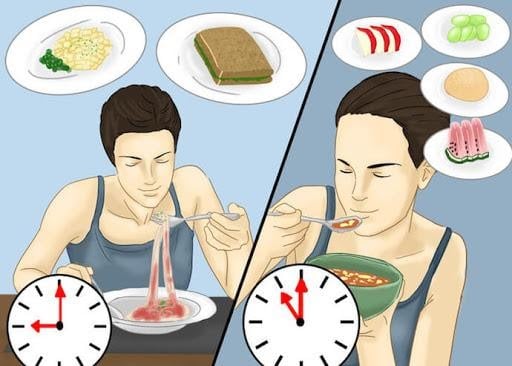Japan is a country known for its strict rules on eating. Specifically, the country has an extremely low obesity rate and the highest life expectancy in the world. All of this is largely due to lifestyle and eating habits.

There are 4 dinner habits of the Japanese that everyone should learn
Eating dinner before going to bed for 3 hours
The Japanese people adhere extremely strictly to dinner habits. Therefore, dinner will usually start after they finish work and gather with their families. Even if they are busy, they still follow the rule of having dinner at least 3 hours before bedtime. By doing so, the stomach has enough time to digest the rice and food in the body.
In addition, if they eat at this time, the lunch has also been completely digested and does not cause too much pressure on the stomach, leading to additional obesity.
Eating lighter than main meals
In the evening, the Japanese usually eat foods that are low in oil, seasonings, and mainly steamed or boiled to facilitate digestion and reduce the accumulation of fat in the body.
Furthermore, the Japanese often consume fish as the main dish during family dinners because fish contains many trace elements and nutrients, helping the body feel full for a long time with a low calorie intake, avoiding weight gain.
Eating less rice
Although rice is one of the main foods, the Japanese only use one bowl of rice per meal. Instead, they choose to eat more side dishes to feel full for longer. In the evening, eating less rice will also prevent the stomach from being too full, as excessive fullness can cause bloating and may lead to diabetes and obesity,…
Not having desserts
In Vietnam, after meals people usually have sweet cakes as desserts to enhance the taste. However, for the Japanese, desserts are only reserved for special occasions. That is why the Japanese instinctively stay away from sugary foods, ice cream, or butter-milk in the evening to avoid the risk of diabetes and obesity.

Some good habits in the evening
Drink half a cup of warm water before going to bed
When a person falls asleep, the body enters a state of repair and requires a lot of water for metabolism. That is why many people feel dry mouth after waking up the next day. Therefore, drinking a glass of water before going to bed is extremely necessary, especially for those with thick blood and cardiovascular diseases.
This is also important for normal people. It helps supplement water, helps prevent excessive water loss during sleep, thereby helping the organs in the body function smoothly and healthier.
However, you don’t need to drink too much, about 100ml is enough to help supplement water for the body. It is best to drink warm water for easy absorption and moisture for cells.
Soak your feet before going to bed
Soaking your feet before going to bed is a very effective health care method. More than 60 acupuncture points on the foot are closely related to the body’s organs. The habit of soaking feet in moderately warm water, massaging the toes and soles of the feet helps promote air and blood circulation, and can also activate meridians, help balance yin and yang, calm the mind, relax the body, and sleep better.
Improved sleep quality helps you feel comfortable and have a healthy body the next day. From there, overall health is also significantly improved, leading to a longer lifespan.
If you want to be healthy and live longer, please maintain these good habits.
Avoid eating late
Eating too late in the evening can cause difficulties in digestion and affect sleep. People with long life expectancy usually eat at least 2-3 hours before going to bed to give the body enough time to digest the food.
Follow the Mediterranean diet
The Mediterranean lifestyle is associated with eating lots of vegetables, fruits, whole grains, fish, poultry, seeds, and legumes. These are nutritious food sources that can impact health and lifespan.
Maintain These 5 Evening Habits for Better Health and Longevity
 Health and Longevity’>
Health and Longevity’>We all aspire to live a healthy, long life. So, don’t overlook these habits, practice them every evening and you will notice a significant improvement in your health.


































